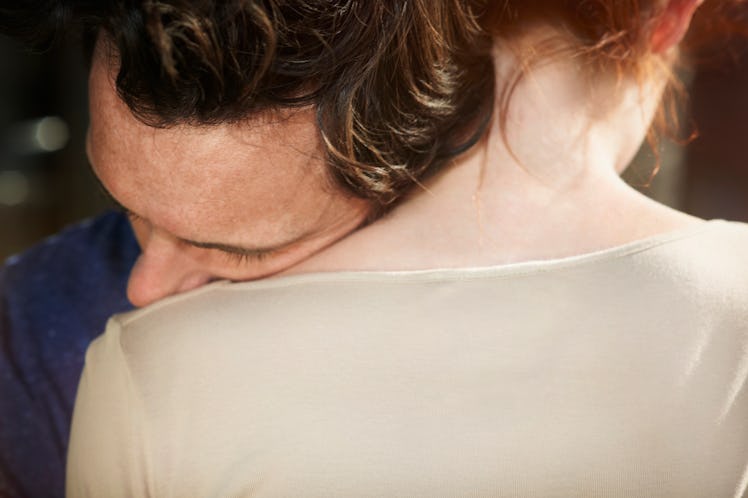Are You And Your Partner A Team, Or Codependent?
A team says “We are in this together.” Codependency says “I can’t do this without you.”

Marriage has a musicality to it. There are moments in minor keys and moments in major. And, if you think about it, there’s always a rhythm guiding the way. It’s good to know when that beat is off, as it signals that you need to reconnect, communicate, find the right time signature again. And when you’re both on the same page and the right notes? That relationship sings; you know you’re working as a team.
That sense of teamwork is, of course, critical to a marriage’s success. It takes work to achieve. Both partners need to communicate openly and honestly and be committed to handling issues and making decisions together as people and as parents.
A challenge to this comes when a healthy partnership tilts over into codependency. When two people open up to each other, that vulnerability can sometimes lead to emotional insecurity and a need for constant validation. Couples who are a team know how to walk that line and stay open and vulnerable while still preserving their own autonomy.
“A team says, ‘We are in this together,’” says Monica Amorosi, a licensed mental health counselor, nationally certified counselor, and a certified clinical trauma professional. “Codependency says ‘I can't do this without you.’”
Couples who are a team know how to walk that line and stay open and vulnerable while still preserving their own autonomy.
Couples who have formed a strong team-based mentality develop a relationship built on support and collaboration, with goals that are clearly defined and each person playing on each other’s strengths. The relationship is open and intimate, based on a mutual respect and understanding of what each other’s needs and desires are. There is a synergy, where each person leverages the other’s strengths to achieve shared goals, while also celebrating and encouraging individual achievements.
“In a team dynamic both individuals maintain their autonomy and can function independently while also relying on each other for emotional and practical support,” ” says Tesa Saulmon, a psychotherapist and relationship expert.
On the other hand, in a codependent relationship, one person tends to assume the role of the caregiver, while the other person is always seeking to have his or her needs consistently met. When that happens, the other person can become lost. If a team dynamic is focused on growth and mutual support, codependence is about entanglement.
“This can make a relationship non-reciprocal, unsatisfying, and very unhealthy,” Amorosi says. “With codependency, there is usually an uptick in conflict, a change in how you relate to each other, how evenly you are both getting your needs met, how evenly you are both sacrificing, how evenly you are both benefiting, and how satisfied you both feel.”
With codependency, there is usually an uptick in conflict, a change in how you relate to each other, how evenly you are both getting your needs met.
How can you spot the shift? When a relationship has slipped into codependency, boundaries tend to erode, creating issues with identity and one person becoming wrapped up in and focused on the emotions and behavior of their partner. As a result, that person may lose sight of their own wants and needs in favor of the needs of their partner. They may also suffer from low self-esteem and not trusting their own ability to make decisions effectively.
“Codependent individuals rely heavily on their partner for emotional support, validation, and purpose,” says Saulmon. “They may feel anxious or empty when apart from their partner and struggle to manage their own emotions independently.”
When a relationship reaches a critical state of codependency, one person’s entire sense of self-worth becomes nearly entirely centered around how to please their partner, neglecting their own needs and desires in the process. They may even put up with abusive behavior or addiction from their partner simply to keep the peace.
“Codependent individuals may feel fearful or anxious about asserting their independence or pursuing their own interests outside the relationship,” Saulmon says. “They may rely on their partner for decision-making and struggle with taking responsibility for their own lives.”
To transition back to a model of teamwork and reliance on each other, couples have to recognize the pattern they’re in and identify where it stems from.
“Codependency doesn't just come out of nowhere,” says Amorsi. “There is usually a driving force for this change in reliance and being able to identify that as a core problem is equally important.”
To transition back to a model of teamwork and reliance on each other, couples have to recognize the pattern they’re in and identify where it stems from.
For couples to form a strong team mindset, it helps to recognize each other as individuals and communicate needs openly and honestly. Don’t be afraid to tell your partner what you are looking for out of the relationship, what is lacking, and what you want to achieve.
“Encourage each other to pursue individual interests, hobbies, and goals,” says Saulmon. “Celebrate and support each other's personal growth and independence.”
It’s also important to focus on self-care. Each person needs to set aside time to focus on their own well-being in order to be their best, and most authentic, selves for their partner.
Most importantly, if you sense your relationship veering into dangerous territory, don’t be afraid to seek help. Couples therapy or individual therapy can be a great way to start unraveling the roots of codependency.
“If you suspect that your relationship may be veering towards codependency or if you're struggling with maintaining a healthy team dynamic, seeking the guidance of a qualified therapist can provide valuable support and guidance,” Saulmon says. “A healthy relationship involves both partners working together as a team while maintaining their individuality and autonomy.”
This article was originally published on